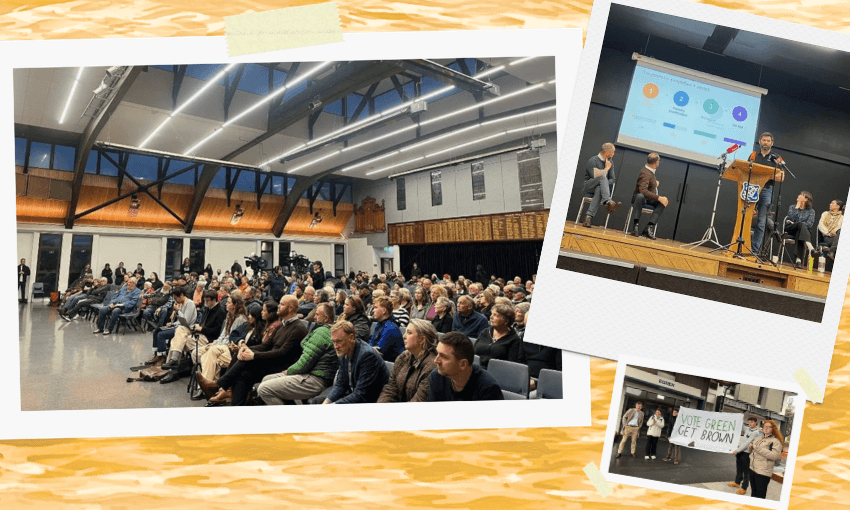From restoring no-cause evictions and 90-day trials to failing to take climate change seriously, the government seems determined to exacerbate insecurity at every turn, argues Max Rashbrooke.
Between their eighth and 12th birthdays, nearly half of all New Zealand children move house. A fifth of these displacements are involuntary, as their families, frequently living in the lowest-quality rentals, are evicted or forced to up sticks in search of housing that is affordable and not actively threatening to human life.
These stark findings, from the Growing Up in New Zealand survey, are a reminder that it is not just our earthquake-prone geography that is precarious: our economic and social arrangements are too. And this is greatly to our shared detriment. In the study, the young people who moved house most often, and thus lost contact with their local health service, were most likely to miss out on treatment they needed. The destabilising shifts from place to place will also, in all likelihood, disrupt their schooling and damage their ability to make friends.
The burdens of precarity, in short, fall heavily on the young. Yet the government seems determined to exacerbate insecurity at every turn.
This can be seen firstly in the reintroduction of no-cause evictions for renters, a disproportionately young cohort. The housing minister, Chris Bishop, wants to give landlords the ability to evict tenants for no reason, something Labour had rightly taken away from them. The notional basis for restoring no-cause evictions is that it’ll make landlords more willing to take a chance on marginalised renters who might otherwise seem too much of a risk.
Such families, though, could – and should – be accommodated in social housing. There is, what’s more, no actual evidence the policy will work, nor is there any good reason why other tenants should suffer such a loss of basic security. In Britain, Bishop’s counterparts in the Conservative Party have pledged to abolish no-cause evictions, not introduce them. In any case, the serious harm done to families, forced to move without reason, surely outweighs any marginal benefit that might accrue. Yet this is “pro-tenant” policy, we’re told.
The second injection of precarity comes via the extension of 90-day trials. Up until now, only small employers have been allowed to fire workers without reason during their first three months. Now, thanks to employment minister Brooke van Velden, all firms can do so. This despite past research finding no evidence that 90-day trials increased average hiring, even for the more disadvantaged jobseekers. The trials achieve nothing of note, but create immense and unjustifiable uncertainty for working people. And it will almost certainly be the sectors where young workers congregate – retail, hospitality and so on – that will make disproportionate use of the extended trials.
The third element of precarity is the most amorphous but also the most important: the failure to take climate change seriously. The budget gutted climate-related initiatives, taking money set aside for emissions reductions and diverting it to tax cuts. Analysis by the New Zealand Institute for Economic Research (NZIER), a highly respected think-tank, found that just 1% of the budget’s new spending was “favourable” to the climate; around 60% was neutral and one-third was “unfavourable”.
At a time when every extra dollar spent should be helping fight climate change – or at the very least not making it worse – this seems unforgivable. More than that, it increases the uncertainty for young people who will live their whole lives with the consequences of these decisions. A much warmer world is a much more unstable one, wracked by unpredictable storms and menaced by ever-rising waters.
Of course New Zealand by itself cannot turn that tide. But as the NZIER points out, the fact that we need other countries to act just heightens our own responsibility. “If we appear unwilling to meet our own commitments,” the think-tank adds, “how can we ask others to meet theirs?” And while National remains notionally committed to meeting our 2030 target to halve emissions, its actions seem likely to focus on planting trees – hardly a credible solution.
So there we have it: insecure tenancies, insecure jobs, an insecure climate. Is there anything on the other side of the ledger, anything the government is doing to reduce precarity? About the best one can say is that Bishop’s desire to lower house prices, if carried through, could make home-buying a more secure prospect. Beyond that, the government’s coalition partners are not giving young people any reason to vote for them next time round. Nor, as I’ve previously written, does the evidence suggest that will happen: young voters, having shifted right last year, seem to be rapidly reverting to their usual leftwing stance.
Diagnoses of anxiety are, famously, widespread amongst the young. While it’s reasonable to wonder whether some of this represents an over-medicalisation of the standard turmoil of young adulthood, it is also not hard to see why the rising generations might feel anxious.
They also have the galling sensation of knowing that while they face a loss of certainty, others get a corresponding increase. Such change always creates winners and losers. No-cause evictions give landlords greater control over their tenants; 90-day trials likewise for employers and their staff. In both cases, the protection of profits takes precedence over the stability of ordinary people’s lives.
The same is true of van Velden’s desire to remove a worker’s right to go to court and challenge their employment status. Currently, people can argue that, even if they signed a piece of paper saying they’re a contractor, they are in truth an employee, essentially operating in a permanent role with their employer controlling their conditions of work, and thus entitled to all the sick leave, holiday pay and other protections that employees get.
Van Velden wants to give employers “certainty” by creating a world where, even if a worker is bullied into signing something that doesn’t reflect reality, they can’t challenge it in court. Curious, isn’t it, how important certainty becomes when corporate interests are at play?





